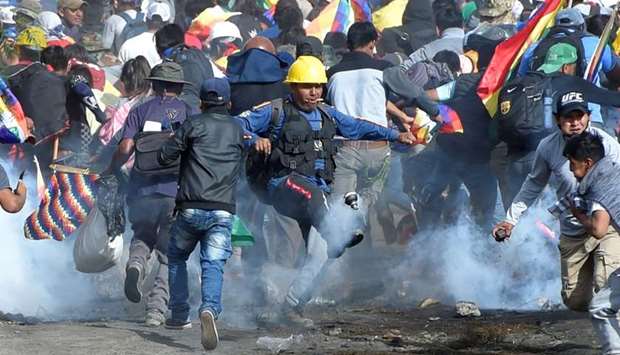At least five people died after being shot in clashes
between coca farmers and security forces in Bolivia on Friday, local
media reported.
A further 34 people were injured and more than 100 were arrested,
according to Nelson Cox, the ombudsman of the city of Cochabamba,
newspaper El Deber wrote.
The farmers were trying to march through Cochabamba to La Paz to
support ousted president Evo Morales, who is in exile in Mexico.
Morales comes from a family of coca farmers.
The police and the military blocked the way of the protesters on a
bridge in Sacaba, an eastern suburb of Cochabamba.
Jaime Zurita, the police chief in Cochabamba, said the farmers
attacked security forces with guns.
The latest violent clashes come as the country's new interim
government and lawmakers from Morales' party are preparing to work
together to stage fresh elections and to restore peace following
nearly a month of protests.
Interim President Jeanine Anez's government and the Movement for
Socialism (MAS) have held talks sponsored by the country's Bishops'
Conference, the European Union and Spain, the daily Pagina Siete
reported on Friday. UN Secretary General Antonio Guterres has also
sent an envoy to Bolivia.
Morales, meanwhile, called for "a national dialogue which guarantees
the return of our beloved Bolivia on the road to democratically
restoring peace," in a post published on Twitter.
Morales resigned on Sunday and went into exile in Mexico two days
later after the Organization of American States (OAS) reported
irregularities in the October 20 elections in which the leftist
president claimed an outright victory against his centre-right
challenger Carlos Mesa.
Morales has rejected Anez's presidency and maintains that he remains
in power, because Congress has not officially accepted his
resignation.
He told the Mexican daily El Universal on Friday that he was hoping
to return to complete his mandate, which expires on January 22, and
to organize elections in which he would no longer be a candidate.
Meanwhile, the interim government on Friday made moves that indicated
it was willing to cut ties with its Latin American neighbours.
All Venezuelan diplomats have been ordered to leave the country
because of their alleged interference with domestic matters,
Bolivia's interim foreign minister, Karen Longaric, announced.
The move marks a radical break with the policies of Morales, who was
one of few remaining backers of Venezuela's Nicolas Maduro.
Bolivia's interim government has recognized opposition leader Juan
Guaido as Venezuela's interim president.
Longaric also said Bolivia plans to leave the ALBA-TCP alliance - an
intergovernmental organization founded by Cuba and Venezuela - and is
considering leaving the UNASUR Union of South American Nations.
Bolivian ambassadors appointed by Morales will also be relieved of
their duties - with the exception of envoys to the Vatican and Peru,
she said.
Longaric said there was evidence that Venezuelans took part in
violent protests against the interim government, and that nine
Venezuelans arrested possessed high-calibre weapons.
Cuba's foreign ministry also said it would withdraw medical staff
after four members of a Cuban medical team were arrested over alleged
participation in pro-Morales protests.
The ministry denied that they had financed and organized
demonstrations and said they had "strictly" carried out only
humanitarian work.
Nicaragua's leftist President Daniel Ortega earlier accused US
"imperialists" of having staged "a coup" in Bolivia and said such
action could encourage people in Latin America to "seek arms to take
power" in revolutions rather than through elections.

Coca growers, supporters of former President Evo Morales, run away from tear gas as one of them kicks a tears gas canister during clashes with riot police in Sacaba, in the outskirts of Cochabamba, Bolivia. Reuters
